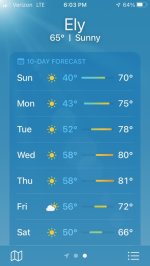I met up with ArtD a couple of weeks ago and the topic of weather came up and I shared something he had never heard before so thought I’d start a thread. We get so dependent on all the weather news, apps, radar at our fingertips it’s almost hard to remember we can just look outside. When I go on a trip I try to get away from all that technology but it’s still nice to be prepared for weather changes. One very good book on practical weather sense is Eric Sloanes ‘Weather Book’ I don’t know if it is still in print but try to find one for when technology goes down. Plus sometimes the big picture weather doesn’t match local conditions.
This was the weather forecast for my canoe trip in the BWCA in 2022, what a forecast. I know at least one other member here was there at the same time. One night I think it was Wednesday as we were boiling/rehydrating the vegatable medley I noticed that I kept having to add more water, more than usual. So I said to my friend we better prepare for some rain tonight or tomorrow morning. He thought I was nuts but went along to humor me. Sure enough by 4 am we hear the pitter patter of rain on the tent fly. It was short lived and by 9 am it was dry and off we went.

I’ve lived in a tent for a year and a half, I’ve lived on a boat for for four summers and most of my working life I’ve been outside doing weather dependent work from land surveying in Idaho and Washington to boat work. Most of that before you could get more than the NOAA report.
I know I didn’t want to start a big varnish job only to find out I missed a weather change.
Another saying that I follow is “dry by 7 rain by 11”. If you wake up to a lot of dew it will be a nice day. Not much or no dew get ready for rain. It didn’t always come by 11 but I don’t remember it being wrong.
So what does your weather eye tell you? How do you spot changes in the weather?
I’ll add more tips from the Weather Book as the thread progresses.
Jim
This was the weather forecast for my canoe trip in the BWCA in 2022, what a forecast. I know at least one other member here was there at the same time. One night I think it was Wednesday as we were boiling/rehydrating the vegatable medley I noticed that I kept having to add more water, more than usual. So I said to my friend we better prepare for some rain tonight or tomorrow morning. He thought I was nuts but went along to humor me. Sure enough by 4 am we hear the pitter patter of rain on the tent fly. It was short lived and by 9 am it was dry and off we went.

I’ve lived in a tent for a year and a half, I’ve lived on a boat for for four summers and most of my working life I’ve been outside doing weather dependent work from land surveying in Idaho and Washington to boat work. Most of that before you could get more than the NOAA report.
I know I didn’t want to start a big varnish job only to find out I missed a weather change.
Another saying that I follow is “dry by 7 rain by 11”. If you wake up to a lot of dew it will be a nice day. Not much or no dew get ready for rain. It didn’t always come by 11 but I don’t remember it being wrong.
So what does your weather eye tell you? How do you spot changes in the weather?
I’ll add more tips from the Weather Book as the thread progresses.
Jim
